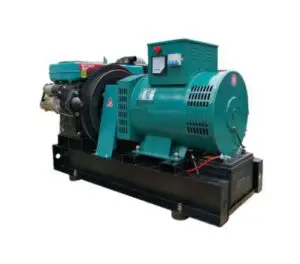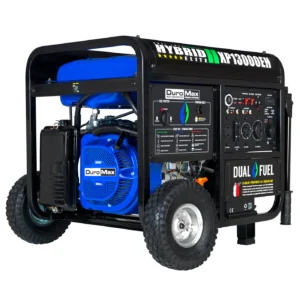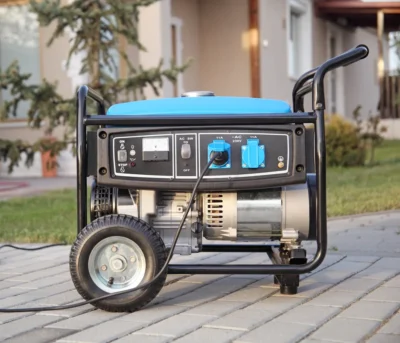Are you curious about how much gas does a generator use per hour? It’s an important consideration when it comes to planning for power outages or using your generator as a reliable backup power source. The amount of gas a generator uses per hour can vary widely depending on the size and type of generator you have, as well as the load you are putting on it.
Generally, portable generators use between 0.5 and 1.5 gallons of fuel per hour, depending on the size of the generator and the load on the generator. For example, a 5,000-watt generator may use up to 1.5 gallons of fuel per hour when running at full load, while a 2,000-watt generator may use closer to 0.5 gallons of fuel per hour when running at a lower load.
It’s important to note that the efficiency of a generator can vary significantly depending on the design and operating conditions. Some generators may be more fuel efficient than others, so it’s a good idea to check the manufacturer’s specifications or test the generator in real-world conditions to get a more accurate estimate of fuel consumption.
How much gas does a generator use per hour?

The amount of gas a generator uses per hour can vary greatly depending on the size and type of generator you have, as well as the load you are putting on it.
Here are some rough estimates to help you get a better understanding of how much gas you can expect your generator to use:
Small portable generators (1,000-5,000 watts): These generators typically use about 0.5-1.5 gallons of gas per hour, depending on the load they are under.
Medium portable generators (5,000-7,500 watts): These generators typically use about 1-2.5 gallons of gas per hour, depending on the load they are under.
Large portable generators (7,500-10,000 watts): These generators typically use about 2-3.5 gallons of gas per hour, depending on the load they are under.
Standby generators (20,000-150,000 watts): These generators, which are often used as backup power sources for homes and businesses, can use anywhere from 3-25 gallons of gas per hour, depending on the size of the generator and the load it is under.
It’s important to note that these are just rough estimates, and the actual amount of gas your generator uses per hour could be different. To get a more accurate estimate of your generator’s fuel consumption, you should consult the manufacturer’s specifications or run a fuel consumption test.
How to Calculate the Fuel Consumption of a Generator
To calculate the fuel consumption of a generator, you will need to know the fuel capacity of the generator’s tank, the rated power output of the generator, and the length of time that the generator is in use. The basic formula for calculating fuel consumption is:
Fuel consumption (gallons per hour) = (rated power output (watts) / fuel efficiency (watts per gallon)) x hours of operation
For example, if you have a generator with a fuel capacity of 20 gallons and a rated power output of 5,000 watts, and you run the generator for 8 hours, the fuel consumption would be:
Fuel consumption (gallons per hour) = (5000 watts / 250 watts per gallon) x 8 hours = 20 gallons
It’s important to note that this formula is based on the generator’s rated power output, which is typically higher than the actual power output. The actual power output will depend on the load being placed on the generator, with higher loads resulting in higher fuel consumption.
Factors that Affect the Fuel Efficiency of a Generator
There are several factors that can impact the fuel efficiency of a generator, including:
1. Load
As mentioned earlier, the load being placed on the generator has a significant effect on fuel efficiency. Generators are typically most fuel-efficient when they are running at or near their rated power output. As the load increases, fuel consumption will also increase.
2. Size and power output
Larger generators with higher power output ratings will typically be less fuel efficient than smaller, lower-powered generators. This is because larger generators have to work harder to produce the same amount of power as a smaller generator, resulting in higher fuel consumption.
3. Fuel type
Different types of fuel have different energy densities, which can impact fuel efficiency. For example, gasoline has a lower energy density than diesel, meaning that a generator running on gasoline will typically be less fuel efficient than one running on diesel.
4. Maintenance
Proper maintenance is essential for ensuring that a generator is operating at its most fuel efficient. Regularly servicing the generator and replacing worn or damaged parts can help to maintain fuel efficiency.
The Average Fuel Consumption of Different Types of Generators
The fuel consumption of a generator will depend on a variety of factors, including the size and power output of the generator, the load being placed on it, and the type of fuel being used. However, here are some rough estimates for the average fuel consumption of different types of generators:
Gasoline generators: Gasoline generators are typically less fuel efficient than diesel or propane generators, with an average fuel consumption of around 250 watts per gallon. However, this can vary significantly depending on the size and power output of the generator.
Diesel generators: Diesel generators are generally more fuel efficient than gasoline generators, with an average fuel consumption of around 300 watts per gallon. Again, this can vary depending on the size and power output of the generator.
Propane generators: Propane generators are typically the most fuel-efficient of the three types, with an average fuel consumption of around 350 watts per gallon.
It’s important to note that these are just rough estimates, and the actual fuel consumption of a generator will depend on a variety of factors.
Tips for reducing the amount of gas a generator uses per hour
There are several ways that you can reduce the amount of gas a generator uses per hour:
1. Use the generator at or near its rated power output
Generators are typically most fuel-efficient when they are running at or near their rated power output. By using the generator at its rated power output, you can help to minimize fuel consumption.
2. Properly load the generator
Avoid overloading the generator by ensuring that the total power draw of the devices and appliances being powered by the generator is within the generator’s power output rating. Overloading the generator can cause it to run less efficiently and consume more fuel.
3. Use fuel-efficient appliances and devices
Energy-efficient appliances and devices will place less of a load on the generator, which can help to reduce fuel consumption.
4. Use a fuel gauge or fuel level indicator
Monitoring the fuel level in the generator’s tank can help you to ensure that the generator is running at optimal efficiency. Running the generator with a low fuel level can cause it to run less efficiently and consume more fuel.
5. Regularly maintain the generator
Proper maintenance is essential for ensuring that a generator is running at its most fuel efficient. This includes regularly servicing the generator, replacing worn or damaged parts, and keeping the generator clean.
The Cost of Operating a Generator Based on Fuel Consumption

The cost of operating a generator will depend on the fuel consumption of the generator, as well as the cost of the fuel being used. To calculate the operating cost of a generator, you will need to know the fuel capacity of the generator’s tank, the rated power output of the generator, the fuel efficiency of the generator, and the cost of the fuel being used.
Using the formula for fuel consumption that was provided earlier, you can calculate the total amount of fuel that the generator will consume over a given period of time. Then, by multiplying that amount by the cost of the fuel, you can determine the total operating cost of the generator.
For example, if you have a generator with a fuel capacity of 20 gallons, a rated power output of 5,000 watts, and a fuel efficiency of 250 watts per gallon, and you run the generator for 8 hours using gasoline that costs $3 per gallon, the operating cost of the generator would be:
Operating cost = (5000 watts / 250 watts per gallon) x 8 hours x $3 per gallon = $96
It’s important to note that this is just a rough estimate, and the actual operating cost of a generator will depend on a variety of factors.
The Environmental Impact of Generator Fuel Consumption
The environmental impact of generator fuel consumption depends on the type of fuel being used and the efficiency of the generator. Generators that use fossil fuels, such as gasoline or diesel, can produce harmful emissions, including carbon dioxide, nitrogen oxides, and particulate matter. These emissions contribute to air pollution and climate change.
Generators that use alternative fuels, such as propane or natural gas, can produce fewer emissions compared to generators that use fossil fuels. However, they can still produce emissions, particularly if they are not operating at optimal efficiency.
To minimize the environmental impact of generator fuel consumption, it’s important to use fuel-efficient generators and to properly maintain and operate them.
The Role of Generator Size and Power Output in Fuel Usage
The size and power output of a generator can have a significant impact on fuel usage. Larger generators with higher power output ratings will typically be less fuel efficient than smaller, lower-powered generators. This is because larger generators have to work harder to produce the same amount of power as a smaller generator, resulting in higher fuel consumption.
When selecting a generator, it’s important to choose one that is appropriately sized for your needs. A generator that is too large for your needs will consume more fuel than necessary, while a generator that is too small may struggle to meet your power needs and may run less efficiently.
How to Extend the Runtime of a Generator by Conserving Fuel
There are several ways that you can extend the runtime of a generator by conserving fuel:
Use the generator at or near its rated power output
As mentioned earlier, generators are typically most fuel-efficient when they are running at or near their rated power output. By using the generator at its rated power output, you can help to minimize fuel consumption and extend the generator’s runtime.
Properly load the generator
Avoid overloading the generator by ensuring that the total power draw of the devices and appliances being powered by the generator is within the generator’s power output rating. Overloading the generator can cause it to run less efficiently and consume more fuel, reducing the generator’s runtime.
Use fuel-efficient appliances and devices
Energy-efficient appliances and devices will place less of a load on the generator, which can help to reduce fuel consumption and extend the generator’s runtime.
Use a fuel gauge or fuel level indicator
Monitoring the fuel level in the generator’s tank can help you to ensure that the generator is running at optimal efficiency. Running the generator with a low fuel level can cause it to run less efficiently and consume more fuel, reducing the generator’s runtime.
Regularly maintain the generator
Proper maintenance is essential for ensuring that a generator is running at its most fuel efficient. This includes regularly servicing the generator, replacing worn or damaged parts, and keeping the generator clean.
The Importance of Proper Maintenance in Maintaining Fuel Efficiency
Proper maintenance is essential for ensuring that a generator is operating at its most fuel efficient. This includes regularly servicing the generator, replacing worn or damaged parts, and keeping the generator clean.
Failing to properly maintain a generator can lead to a variety of problems that can impact fuel efficiency, including:
1. Dirty or clogged air filters
Air filters that are dirty or clogged can restrict airflow to the engine, which can cause the generator to run less efficiently and consume more fuel.
2. Worn or damaged spark plugs
Spark plugs that are worn or damaged can cause misfires, which can reduce the efficiency of the generator and increase fuel consumption.
3. Worn or damaged fuel lines
Fuel lines that are worn or damaged can cause fuel leaks, which can reduce the efficiency of the generator and increase fuel consumption.
By regularly maintaining your generator and ensuring that it is in good working order, you can help to maintain fuel efficiency and extend the generator’s runtime.
The Difference Between Gasoline, Diesel, and Propane Generators in Terms of Fuel Consumption
Different types of generators can have significantly different fuel consumption rates. Here is a brief overview of the fuel consumption of gasoline, diesel, and propane generators:
Gasoline generators
Gasoline generators are typically less fuel efficient than diesel or propane generators, with an average fuel consumption of around 250 watts per gallon. However, this can vary significantly depending on the size and power output of the generator.
Diesel generators
Diesel generators are generally more fuel efficient than gasoline generators, with an average fuel consumption of around 300 watts per gallon. Again, this can vary depending on the size and power output of the generator.
Propane generators
Propane generators are typically the most fuel-efficient of the three types, with an average fuel consumption of around 350 watts per gallon.
It’s important to note that these are just rough estimates, and the actual fuel consumption of a generator will depend on a variety of factors.
Using a Fuel Gauge or Fuel Level Indicator to Monitor Fuel Usage

A fuel gauge or fuel level indicator is a useful tool for monitoring the fuel usage of a generator. By keeping track of the fuel level in the generator’s tank, you can ensure that the generator is operating at optimal efficiency and minimizing fuel consumption.
To use a fuel gauge or fuel level indicator, simply check the reading on the gauge or indicator to determine the current fuel level. If the fuel level is running low, refill the tank to ensure that the generator has an adequate supply of fuel.
It’s important to note that fuel gauges and fuel level indicators can be inaccurate, particularly if the generator is not level or if the fuel tank is not properly vented. To ensure the most accurate readings, it’s a good idea to check the fuel level manually by using a dipstick or by visually inspecting the fuel tank.
The Impact of Load on a Generator’s Fuel Consumption
The load placed on a generator has a significant effect on fuel consumption. Generators are typically most fuel-efficient when they are running at or near their rated power output. As the load increases, fuel consumption will also increase.
To minimize fuel consumption, it’s important to properly load the generator by ensuring that the total power draw of the devices and appliances being powered by the generator is within the generator’s power output rating. Overloading the generator can cause it to run less efficiently and consume more fuel.
How to Estimate the Fuel Cost for a Generator-Powered Event or Project
To estimate the fuel cost for a generator-powered event or project, you will need to know the fuel consumption of the generator, the duration of the event or project, and the cost of the fuel being used.
Using the formula for fuel consumption provided earlier, you can calculate the total amount of fuel that the generator will consume over the duration of the event or project. Then, by multiplying that amount by the cost of the fuel, you can determine the total fuel cost for the event or project.
For example, if you have a generator with a fuel capacity of 20 gallons, a rated power output of 5,000 watts, and a fuel efficiency of 250 watts per gallon, and you plan to run the generator for 8 hours at the cost of $3 per gallon, the total fuel cost for the event or project would be:
Total fuel cost = (5000 watts / 250 watts per gallon) x 8 hours x $3 per gallon = $96
It’s important to note that this is just a rough estimate, and the actual fuel cost for an event or project will depend on a variety of factors.
The Benefits of Using a Fuel-Efficient Generator
Using a fuel-efficient generator can offer a number of benefits, including:
Cost savings: Fuel-efficient generators consume less fuel, which can result in significant cost savings over time.
Extended runtime: Fuel-efficient generators have a longer runtime, which can be particularly useful in situations where a reliable power source is critical, such as during an emergency or during a power outage.
Reduced emissions: Fuel-efficient generators produce fewer emissions compared to less efficient generators, which can have a positive impact on the environment.
Increased reliability: Fuel-efficient generators are typically more reliable due to their ability to run for longer periods of time without requiring a fuel refill.
Overall, using a fuel-efficient generator can provide a variety of benefits, including cost savings, extended runtime, reduced emissions, and increased reliability.
Recommended:
- How much does a head of cauliflower weigh?
- How much does a goat weigh?
- How much does a gallon of gas weigh?
Conclusion
The amount of gas a generator uses per hour depends on several factors, including the size and type of the generator, the load on the generator, and the efficiency of the generator. For example, a small portable generator may use as little as 0.5 gallons of gas per hour, while a larger standby generator may use several gallons per hour.
The best way to determine how much gas does a generator use per hour is to consult the manufacturer’s specifications or to perform a load test to measure the actual consumption.


